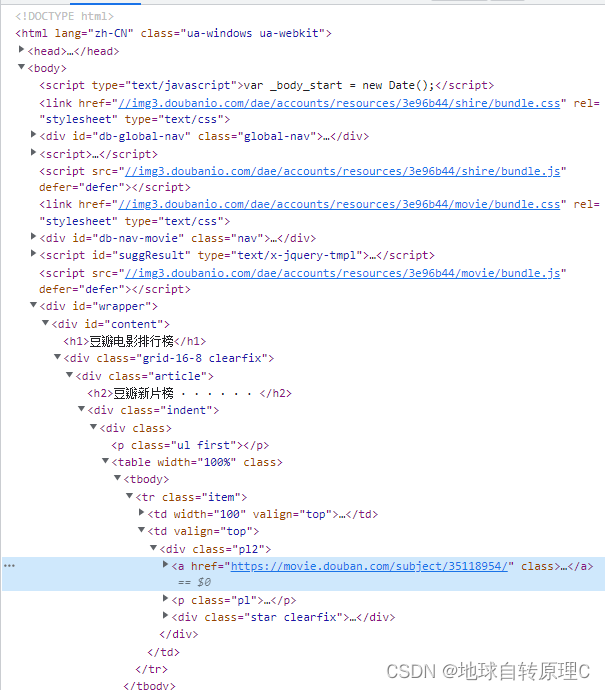爬虫入门:python爬取豆瓣影评及影片信息:影片评分、评论时间、用户ID、评论内容
豆瓣网作为比较官方的电影评价网站,有很多对新上映影片的评价,不多说,直接进入正题。
思路分析
爬取的目标网站为豆瓣网,链接: https://movie.douban.com/chart。可以看到最新上映的电影的相关信息,但是含有电影评论的网址是一个二级链接,需要点击电影进入详细信息才可以查看,所以第一步需要获得影片的链接。观察后可以看到链接如下:
使用BeautifulSoup和正则表达式re库可以解析这个网站所在的class以及确定具体链接所在的位置,具体方式如下:
bs = BeautifulSoup(html.text,'html.parser')
movie_list = bs.find_all(class_='item')#定位链接元素
links = re.compile('class="nbg" href="(.*?)" title=')
links = re.findall(links,str(movie_list))
可以在控制台看到是否查询成功,得到的结果如下:
['https://movie.douban.com/subject/35118954/','https://movie.douban.com/subject/35414623/','https://movie.douban.com/subject/35230876/','https://movie.douban.com/subject/34477861/','https://movie.douban.com/subject/35507172/','https://movie.douban.com/subject/35700395/','https://movie.douban.com/subject/30362175/','https://movie.douban.com/subject/35240235/','https://movie.douban.com/subject/35073886/','https://movie.douban.com/subject/35056243/']在这里插入代码片
拿到这些链接之后,在分别请求这些链接,分析页面,就可以拿到最后所需要的数据。
for item in links:#TODO 解析页面 定位元素...pass
元素定位
分析页面 得到各个所需的信息所在位置 综合使用re和BeautifulSoup定位即可 以用户ID为例:(因为这里有短评和长评两种,所以分开查询)
#用户名称
user = comment.find_all(class_ ='comment-info')
user = re.findall('href.*?/">(.*?)</a>',str(user))
subscriber = re.findall('class="name".*?href.*?/">(.*?)</a>',str(long_comment))#print(subscriber) 打印用户名称信息#['CydenyLau', '斯宾诺莎画板', 'Zion', '莫选好片', '小小X', '今夜', 'Maggie_in_LA', 'Gary', '辉兔的爱与生活', '职业影迷']
这里有一个小tips:查找元素的时候要由大到小查询,先查询大的包含的元素,在慢慢锁定自己需要的内容、有用的信息。理论上来说是可以直接用re精确定位到自己所需要的元素 但是这样定位的精度低、错误率高,不建议使用。
完整代码
完整代码如下,复制就可以直接使用,最后使用Dataframe存储数据,也可以保存到本地:
import requests
import re
from bs4 import BeautifulSoup
import pandas as pd
url ='https://movie.douban.com/chart'#headers是将爬虫脚本伪装为浏览器请求 如果没有浏览器headers 请求结果是空的 所以一定要加headers
headers ={'User-Agent':'Mozilla/5.0 (Windows NT 10.0; Win64; x64) AppleWebKit/537.36 (KHTML, like Gecko) Chrome/105.0.0.0 Safari/537.36'}
html = requests.get( url , headers = headers)
bs = BeautifulSoup(html.text,'html.parser')
movie_list = bs.find_all(class_='item')#定位链接元素
links = re.compile('class="nbg" href="(.*?)" title=')
links = re.findall(links,str(movie_list))#为代码整洁 减少冗余代码 defcollection_data(pakeage =None,data =None):for item in data:
item.replace(" ",'')
pakeage.append(item)return pakeage
#声明容器
movies_title,release_date,movies_rate,comment_user,movie_comment,comment_postline=[],[],[],[],[],[]#通过链接找到新的页面for item in links[:1]:
page = requests.get(item,headers=headers)
page = BeautifulSoup(page.text,'html.parser')#标题
title = page.find_all(id='content')
set_title = re.compile('property="v:itemreviewed">(.*?)</span>')
title = re.findall(set_title,str(title))#年份
year = page.find_all(class_ ='year')
year = re.findall(">(.*?)</span>",str(year))#评分
rate = page.find_all(class_ ='ll rating_num')
rate = re.findall('"v:average">(.*?)</strong>',str(rate))#短评信息
comment = page.find_all(class_="comment")
comment = BeautifulSoup(str(comment),'html.parser')#发表时间
postline = comment.find_all(class_='comment-time')
postline = re.findall('title="(.*?)"',str(postline))#评论内容
short_commentary = comment.find_all(class_ ='comment-content')
short_commentary = re.findall('"short">(.*?)</span>',str(short_commentary))#用户名称
user = comment.find_all(class_ ='comment-info')
user = re.findall('href.*?/">(.*?)</a>',str(user))#正常影评
long_comment = page.find_all(class_ ='main review-item')#用户
subscriber = re.findall('class="name".*?href.*?/">(.*?)</a>',str(long_comment))#评论发表时间
long_comment = BeautifulSoup(str(long_comment),'html.parser')
set_time = re.compile('main-meta".*?">(.*?)</span>')
posttime = re.findall(set_time,str(long_comment))#
commentary = long_comment.find_all(class_ ='short-content')
set_comment = re.compile('"short-content">(.*?)\(<a.*?</a>',re.S)
commentary = re.findall(set_comment,str(commentary))
comment_user = collection_data(comment_user,user)
comment_user = collection_data(comment_user,subscriber)
movie_comment = collection_data(movie_comment,short_commentary)
movie_comment = collection_data(movie_comment,commentary)
comment_postline = collection_data(comment_postline,postline)
comment_postline = collection_data(comment_postline,posttime)for i inrange(len(comment_postline)):
movies_title = collection_data(movies_title,title)
release_date = collection_data(release_date,year)
movies_rate = collection_data(movies_rate,rate)
dataframe = pd.DataFrame({"title":movies_title,"release_date":release_date,"rate":movies_rate,"user":comment_user,"comment":movie_comment,"postline":comment_postline
})#保存信息到本地#dataframe.tocsv("本地路径",encoding = 'gbk')
如果对本文有任何疑问 欢迎讨论交流!点个赞再走哦!
版权归原作者 地球自转原理C 所有, 如有侵权,请联系我们删除。